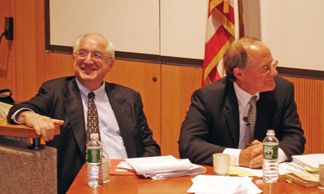King Lear goes to court in 'Law and Order' spinoff at Weill Cornell
By Brenda Tobias

Dim the lights; cue sound; listen for the familiar "duh dum" of the opening montage to "Law and Order." This was not in your living room, and the cast did not include Sam Waterston. It was in Uris Auditorium at Weill Cornell Medical College (WCMC), and the cast included Dominic Chianese (Uncle Junior to "The Sopranos" devotees).
The story line was not ripped from the headlines "Law and Order" style but from Shakespeare for WCMC's Humanities and Medicine Series.
"Law and Order: Elizabethan Unit" occurred Sept. 20 for a packed house. The Hon. Kristen Booth Glen (formerly of the New York State Supreme Court) presided over King Lear v. Goneril and Regan.
The audience was asked to suspend imagination and concur that King Lear did not, in fact, die, but survived and was petitioning the court for the return of his kingdom. Lear (played by Chianese) claimed that he was not competent when he handed the majority of his kingdom (and power) to daughters Goneril and Regan.
Because the essence of the trial was the competency of Lear at the moment he made the gift to his two daughters, the medical experts scrutinized the definition of competency. Often Lear's behavior toward Cordelia was brought into question in either defense or dispute of his competency claim.
The preponderance of testimony came from counsel for Lear and counsel for Goneril and Regan and their respective medical-expert witnesses. Like all good "Law and Order" spinoffs, art did vaguely intimate the headlines. The counsel for Lear's daughters was "played" by Kenneth Warner, the real-life counsel for Anthony Marshall (son of Brooke Astor). Warner's adversary, Goneril and Regan's counsel, Daniel Kornstein, trumped Warner in experience, having previously defended Hamlet and represented Shylock (in moot court, of course).
The medical experts were none too shabby either. Dr. Paul Appelbaum is professor of psychiatry and director of the Division of Psychiatry, Law and Ethics at Columbia University. Dr. Robert Michels is the former Stephen and Suzanne Weiss Dean of Cornell's Medical College and provost for medical affairs of Cornell (1991-96) and the current Walsh McDermott University Professor of Medicine at WCMC.
In the end, Judge Glen ruled for Goneril and Regan, stating, "A reasoned decision is not necessarily a good decision, and we believe in the right of people to make bad decisions, unless it is a danger to themselves."
The Humanities and Medicine Series was started in 1999 and is sponsored by Debra Gillers, associate dean for academic affairs and registrar at WCMC.
Brenda Tobias '97 is director of Cornell-New York City relations. The CU in the City column appears monthly. To suggest an item for coverage, e-mail Tobias at NYC@cornell.edu.
Media Contact
Get Cornell news delivered right to your inbox.
Subscribe